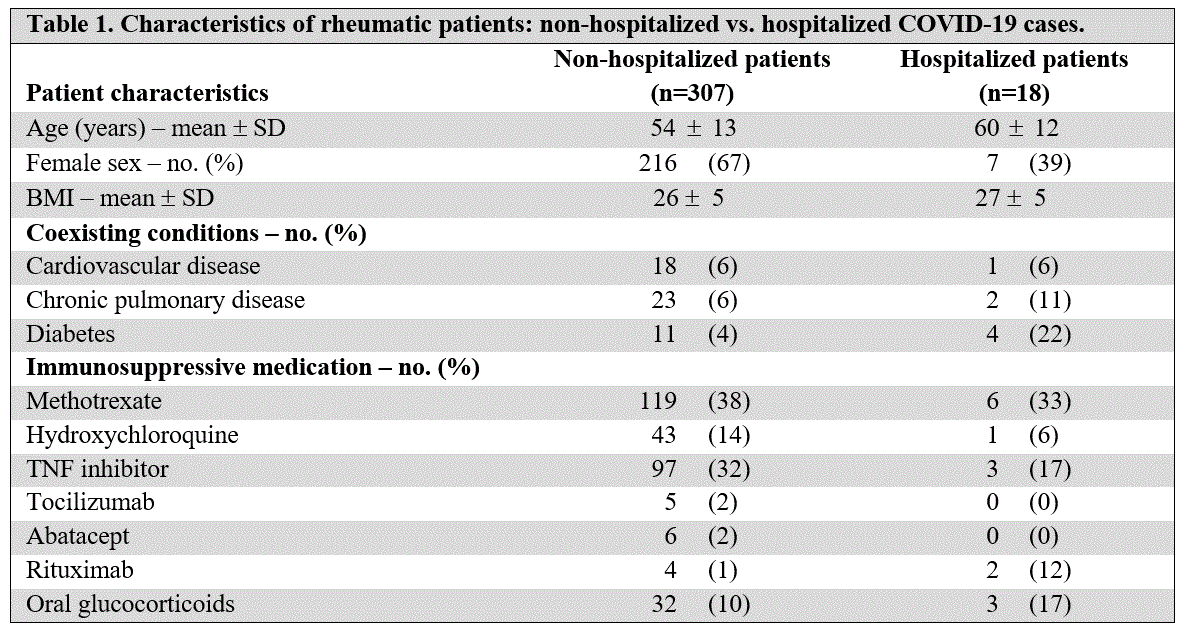Session Information
Date: Saturday, November 6, 2021
Title: Epidemiology & Public Health Poster I: COVID-19 & Vaccination (0084–0117)
Session Type: Poster Session A
Session Time: 8:30AM-10:30AM
Background/Purpose: Retrospective studies have suggested that patients with rheumatic diseases may be at increased risk of severe COVID-19 related disease, and that this risk may partly be related to specific antirheumatic therapies. We investigated this in a large prospective controlled cohort study. The primary objective of the study was to investigate whether patients with rheumatic diseases are at increased risk of developing severe COVID-19 manifestations, defined as hospitalizations, compared to the general population. Secondary objectives were to analyze associations between anti-rheumatic treatment and disease severity of COVID-19, and to monitor the sustainability of SARS-CoV-2 specific IgG antibody titers over time.
Methods: All adult patients with inflammatory rheumatic diseases from the Amsterdam Rheumatology & Immunology Center, Amsterdam and Amsterdam UMC were invited to participate in the study (Netherlands Trial Register, trial ID NL8513). Patients were asked to register their own healthy control subject who were of the same sex and comparable age. During follow-up, participants received three digital questionnaires assessing patient and COVID-19 related characteristics. Serum samples were collected at two different time points, and analyzed for the presence of SARS-CoV-2 specific antibodies using a highly sensitive RBD-Ab bridging ELISA. COVID-19 cases were defined as participants with at least one positive PCR or a positive antibody test result.
Results: Between April, 2020, and March, 2021, 3279 rheumatic patients and 1110 healthy controls were included in the study. The mean age of patients and controls was 58 ± 13 and 56 ± 13 years respectively, and 1647 (63%) patients and 626 (69%) controls were female. Diagnosis of COVID-19 was confirmed in 307 (9%) patients and 128 (12%) healthy controls. The COVID-19 related hospitalization rate was significantly higher in patients compared to controls; 18 (6%) patients and 1 (1%) healthy control were hospitalized (P 0.02). Table 1 compares characteristics of non-hospitalized and hospitalized rheumatic patients with a confirmed COVID-19 diagnosis. It can be seen that patients with older age, male sex, a history of chronic pulmonary disease or diabetes, and patients who were treated with prednisone or rituximab were more frequently hospitalized. In contrast, patients treated with hydroxychloroquine or TNF-inhibitors were less frequently hospitalized.
Conclusion: Our data suggest, albeit based on a limited number of patients in the hospitalization group, that patients with rheumatic diseases are at increased risk of COVID-19 related hospitalization. In addition, treatment with rituximab or prednisone seems to increase the risk of COVID-19 related hospitalization, while treatment TNF-inhibitors and hydroxychloroquine may have protective effects.
To cite this abstract in AMA style:
Boekel L, Hooijberg F, Vogelzang E, Leeuw M, Atiqi S, van Vollenhoven R, Voskuyl A, van der Horst-Bruinsma I, Lems W, Kuijpers T, van Ham M, Wieske L, Eftimov F, Steenhuis M, Keijzer S, Christianawati O, Loeff F, Tas S, Nurmohamed M, Rispens T, Wolbink G. Patients with Inflammatory Rheumatic Diseases Are at Increased Risk of COVID-19 Related Hospitalization: Data from a Prospective Controlled Cohort Study [abstract]. Arthritis Rheumatol. 2021; 73 (suppl 9). https://acrabstracts.org/abstract/patients-with-inflammatory-rheumatic-diseases-are-at-increased-risk-of-covid-19-related-hospitalization-data-from-a-prospective-controlled-cohort-study/. Accessed .« Back to ACR Convergence 2021
ACR Meeting Abstracts - https://acrabstracts.org/abstract/patients-with-inflammatory-rheumatic-diseases-are-at-increased-risk-of-covid-19-related-hospitalization-data-from-a-prospective-controlled-cohort-study/

